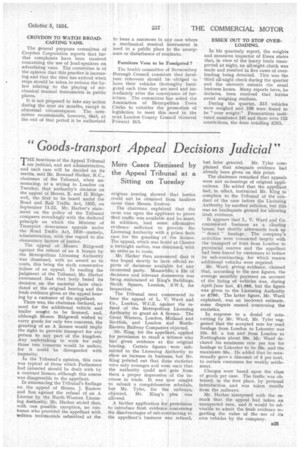" Goods-transport Appeal Decisions Judicial"
Page 43

If you've noticed an error in this article please click here to report it so we can fix it.
More Cases Dismissed by the Appeal Tribunal at a Sitting on Tuesday
THE functions of the Appeal Tribunal are judicial, and not administrative, and each case will be decided on its merits, said Mr. Rowand Harker, K.C., chairman of the Tribunal, when announcing, at a sitting in London on Tuesday, that authority's decision on the appeal of Messrs. E. and H. Ridgewell, the first to be heard under the Road and Rail Traffic Act, 1933, on September 11-12. Mr. Harker's statement on the policy of the Tribunal compares revealingly with the declared principle on which the Minister of Transport determines appeals under the Road Traffic Act, 1930—namely, administration, with due regard to the elementary factors of justice.
The appeal of Messrs. Ridgewell against the refusal of an A licence by the Metropolitan Licensing Authority was dismissed, with no award as to costs, this being the sixth consecutive failure of an appeal. In reading the judgment of the Tribunal, Mr. Harker announced that that body based its decision on the material facts elucidated at the original hearing and the fresh evidence given at the appeal hearing by a customer of the appellant.
There was, the chairman declared, no need for the additional vehicle and trailer sought to be licensed, and, although Messrs. Ridgewell wished to carry goods for only two concerns, the granting of an A licence would imply the tight to provide transport for any person to any part of the kingdom. Any undertaking to work for only those two concerns would be useless, for it could be disregarded with impunity.
In the Tribunal's opinion, this case was typical of those which Parliament had intended should be dealt with by a contract licence, although this course was disagreeable to the appellant. In announcing the Tribunal's findings on the appeal of Messrs. J. Enstow and Son against the refusal of an A Licence by the North-Western Licensing Authority, Mr. Harker stated that, with one possible exception, no customer who provided the appellant with written testimonials submitted at the original hearing showed that lorries could not be obtained from hauliers other than Messrs. Enstow.
The chairman explained that the onus was upon the applicant to prove that traffic was available and he must, in addition, lead some affirmative evidence sufficient to provide the Licensing Authority with a prima facie case for the granting of the licence. The appeal, which was heard at Chester a fortnight earlier, was dismissed, with no order as to costs.
Mr. Harker then announced that it was hoped shortly to have official reports of decisions available for any interested party. Meanwhile, a file of decisions and relevant documents was being maintained at King's Buildings, Smith Square, London, S.W.1, for inspection.
The Tribunal next commenced to hear the appeal of L. V. Ward and Co-, London, W.C2, against the refusal of the Metropolitan Licensing Authority to grant an A licence. The Great Western, London, Midland and Scottish, and London and NorthEastern Railway Companies objected.
Mr. King, for the appellant, applied for permission to recall a witness who had given evidence at the original hearing. Certain figures were submitted to the Licensing Authority to show an increase in business, but Mr. King pointed out that these statistics were only averages and were such that the authority could not gain from them a proper impression of the increase in trade. It was now sought to submit a compiehensive schedule, but Mr. Tyler, fiar the railways, objected. Mr. King's plea was allowed.
A further application for permission to introduce fresh evidence concerning the disadvantages of sub-contracting to the appellant's business was refused, but later. granted. Mr. Tyler com plained that adequate evidence had already been given on this point.
The chairman remarked that appeals were not re-hearings of original applications. He added that the appellant had, in effect, instructed Mr. King to complain to the Tribunal of the conduct of the case before the Licensing Authority by another solicitor, but this was an inadequate ground for allowing fresh evidence.
It appears that L. V. Ward and Co. commenced business as a clearinghouse, but shortly afterwards took up "
direct" haulage. The company's activities were connected largely with the transport of fruit from London to provincial centres and the appellant had been forced by customers to reduce its sub-contracting, for which reason additional vehicles were required.
Mr. Ward, giving evidence, claimed that, according to the new figures, the average monthly payment on account of the hiring of vehicles was, during April-June last, £1,086, but the figure was given to the Licensing Authority as £780. The latter figure, Mr. Ward explained, was an incorrect estimate. some dispute ensued concerning the statistics.
In response to a denial of rate. cutting by Mr. Ward, Mr. Tyler suggested that the accepted rate for road haulage from London to Leicester was 22s. 6d. a ton and from London to Nottingham about 20s. Mr. Ward declared his minimum rate per ton for haulage to Leicester to be 20s. and the maximum 35s. He added that he occasionally gave a discount of 5 per cent. to certain customers for weekly settlement.
Charges were based upon the class of goods per case. The traffic was obtained, in the first place, by personal introduction and was taken mostly from the railways.
-Mr. Harker interposed with the remark that the appeal had taken an unexpected turn, and it would be advisable to admit the fresh evidence regarding the value of the use of its own vehicles bY the company;




































































































